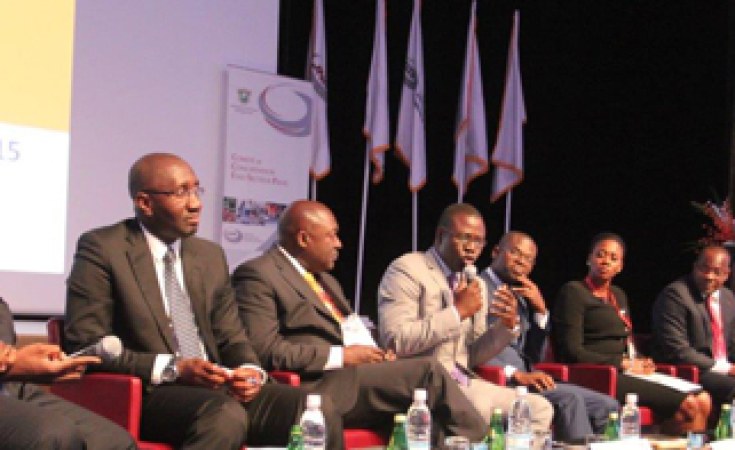How can the Ivorian Government and the private sector combine their efforts to attract investment, raise capital and finance enterprises, to ensure the country's progress towards emergence by 2020? To respond to the question, the Government, in partnership with the African Development Bank Group and the World Bank, organised the National Day for State-Private Sector Partnership on Monday, April 27 in Abidjan to evaluate the commitments of the State, to take stock of joint actions and to develop a more focused plan to build a prosperous Ivorian economy.
In response to the invitation from Ivorian Prime Minister Daniel Kablan Duncan, more than 1,500 participants including government officials, representatives from the public and private sectors, ambassadors, development partners, AfDB and World Bank experts, and representatives of civil society came to the Abidjan event hear about ways to strengthen the role and influence of public-private sector partnerships.
With the theme of "The State and the private sector progressing towards emergence", the conference also had the goal of mapping out fresh perspectives and creating a framework for innovative exchanges, to enable the state and the private sector to pool their efforts towards the emergence of the country's economy by 2020.
Several speakers emphasized the role played by the Bank Group in the development of the private sector in Côte d'Ivoire through deploying all its financial and technical resources. The presentation of Issa Faye, Division Manager in the AfDB's Development Research Department, was particularly appreciated during panel discussions on "Financial Inclusion, the driver for development of SMEs".
The Minister of State, Minister of Plan and Development, Albert Mabri Toikeusse, represented the Prime Minister at the meeting. Speaking on the conference theme, he said the commitment of the state and the private sector was critical because achieving emergence by 2020 would be a considerable challenge. He pointed to the necessity of developing economic infrastructure (building basic infrastructure and energy), improving human capital (improving the education system for greater capacity development), cleaning up the business environment, promoting employment and working to develop a dynamic private sector.
"The Ivorian private sector is experiencing a series of unprecedented challenges to its growth and competitiveness, enabling SMEs to access finance and to create employment for a successful, sustainable economy," said Jean-Kacou Diagou, President of the General Confederation of Businesses of Côte d'Ivoire, stressing that "stakeholders must play their part, to enable the country to go far and move quickly to emergence."
Janvier Litse, Acting Vice-President of the AfDB, Operations, Country and Regional Programs and Policy, noted the centrality of development of a strong, job-creating private sector in the Ivorian Government's programme. He recalled that the national partnership day had received AfDB support to lay the groundwork for the strong growth the Ivorian economy is experiencing.
"Effective implementation of the national partnership day," he observed, "has enabled the strong economic growth that Côte d'Ivoire is experiencing, the restoration and construction of infrastructure and the management of the structural transformation of the economy, returning Côte d'Ivoire to its role of regional leadership."
Litse also stressed the role of SMEs in sustainable development, through their contribution to its different dimensions and, in particular, to the fight against poverty and the integration of women into the world of enterprise. For him, the acceleration of urbanization, with its corollary of major needs to be met such as the construction of homes and services of all kinds, represented great opportunities for SMEs.
Litse noted, however, that SMEs had very limited resources. "SMEs are also fragile economic agents that do not always have the resources to withstand major shocks. When they do not unite their resources they have limited powers of negotiation, which increases their difficulty of access to finance and to technology transfer," he noted, urging the various stakeholders to work for better access to finance for SMEs. "Côte d'Ivoire can count on the AfDB to implement innovative solutions for emergence 2020," Litse said.
The Bank has a strong presence at Côte d'Ivoire's side. The Bank country brief for 2011-2012 set out a rapid re-engagement strategy through the AfDB's concessional window, the African Development Fund, in accordance with the Transition Support Department (formerly the Fragile States Facility).
The ADF also funded the Emerging from Conflict Multi-sector Support Project, which it received one of two US Treasury Awards for Development Impact in July 2013.
Vice-President Litse also recalled two important guarantees of the Bank's presence by the side of Côte d'Ivoire and the Ivorian people: the effective return of the Bank and its staff to its historic headquarters in Abidjan, and the construction of the Henri Konan Bédié Bridge, the result of successful collaboration between the state and the private sector, for which the Bank arranged the funding and made a contribution of more than 38 billion CFA francs.
The AfDB contributed 280 billion CFA francs from 2012 to 2014 to the financing of the Ivorian private sector.
It is through its direct action to SMEs and its indirect action towards the environmental ecosystem that the Bank intends to continue to support Côte d'Ivoire's progress.


